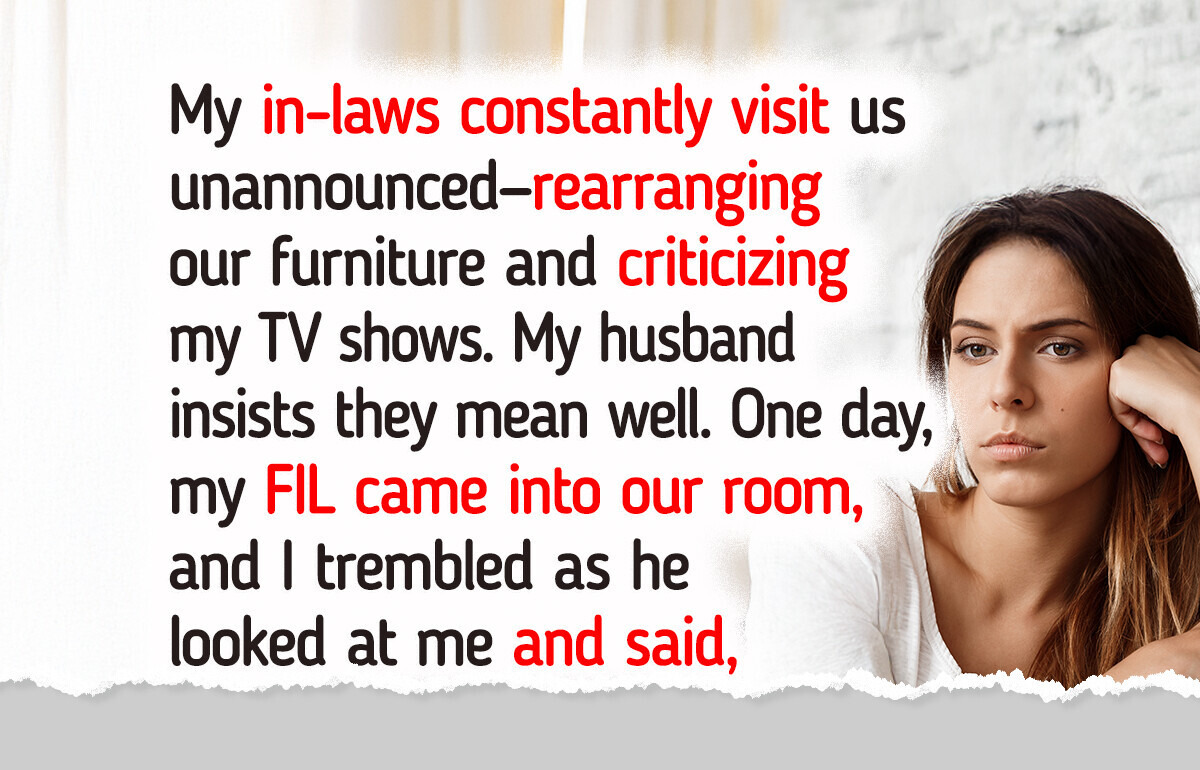You are on your way to being pushed around in your marriage. And if that's what you want it just keep being quiet. Stand up for yourself. It's that simple.
His Parents Are Destroying My Peace—Even My Marriage Can Be in Danger

Having a balanced and good relationship with in-laws is often not an easy job. It requires lots of patience and real love towards your other half. But neither of them will help if they cross a border and intrude into your everyday life, as the letter from one of our readers, Kate, proves.
Issues with the in-laws
Dear Bright Side,
I’ve been married for two years now, but my relationship with my husband’s parents is just getting worse. It started off as a small annoyance. They would visit, unannounced, but I brushed it off as just part of being married.
At first, it was manageable; I’d offer them coffee, exchange pleasantries, and carry on. But over time, their constant visits turned my home into a battlefield.
My mother-in-law rearranges our furniture without asking, and my father-in-law criticizes everything, even my choice of TV shows. I stay quiet, trying to keep the peace. But inside, I’m falling apart. My husband insists they “mean well,” but every time they come over, it feels like my peace is slipping further away.
One day, my father-in-law came into our room, and I trembled as he said my lasagna “could use more seasoning.” The truth is, I’ve always taken pride in my cooking, but now I dread preparing meals in my own kitchen.
When I try to talk to my husband about it, he just brushes it off. “You’re just being sensitive,” he says. But I can feel the tension building between us. He doesn’t see the emotional toll it’s taking on me.
I want to tell him how much his parents’ visits are driving me to the edge, but I’m terrified of how he’ll react. Will he take their side? Will he think I’m overreacting?
I just want peace in my own home. Is that too much to ask?
— Kate
Thank you, Kate, for your letter. You’re not alone with this issue, let’s see what you can do in this uncomfortable situation.
Intrusion into your life
It might seem like your in-laws are dropping by because they “care,” but surprise visits can disrupt your peace and mental space. It’s okay to kindly ask them to call before visiting. Your mother-in-law might think she’s helping by rearranging things, but when someone treats your space like their own, it’s more than just annoying; it’s invasive.
Setting boundaries with in-laws is a delicate balance between maintaining a good relationship and preserving your own peace of mind. It’s about creating a healthy dynamic where everyone feels respected and understood.
Reacting to criticism
When criticism isn’t constructive or asked for, it often reflects more about the critic’s need for control than about your actual cooking skills. Irrelevant comments are not worthy of a response, or of any emotional reaction on your part.
In fact, ignoring them may encourage the criticizer to lighten up. Of course, few people have mastery of their emotional reactions, and it’s natural to feel annoyed by such remarks, but not responding is the important thing.
Discussing your emotions
When someone dismisses your feelings, it can slowly erode your confidence. Feeling neglected can create a growing emotional gap between you and your partner. And emotional neglect can lead to physical disconnection. The effects of these issues can put immense strain on the relationship.
In order to avoid this, as a first step, try to arrange a quiet, uninterrupted time to speak with your partner about what it is that is bothering you. Use “I” statements to communicate your feelings without sounding accusatory. This approach encourages a constructive dialogue and helps him understand your perspective. After you express your thoughts and feelings, give your partner a chance to talk and attentively listen to them.
Setting up boundaries
Once the two of you have made all of your points, try to come up with a solution that addresses the problem. Identify the boundaries you need to feel respected and valued. Be specific about what needs to change and why it’s important for the health of your relationship. Ensure that both of you agree on these boundaries and are committed to upholding them.
If the situation doesn’t improve, ask for professional help. Counseling can provide a neutral space to explore the underlying issues, while a counselor can also offer tools and strategies to improve communication and help both partners feel heard and valued.
Your relationship with your parents can turn sour as well, just like it happened in this story: My Parents Ignored Me My Whole Life, Then Called Me When They Needed a Free Nanny.
Comments
Please remember parents are parents , they still consider you as their kids in need of help and guidance . Take it positiv and think over it , tomorrow you as old mother would like to visit your married son or daughter out of share love and would like to help them as they are still kids and try to help them out .
Just give it a thought .
Related Reads
13 Stories About Coworkers From Hell Who Took Workplace Drama to New Levels

12 True Stories That Could Outshine Hollywood’s Biggest Drama Plots

14 Stories That Prove Kindness Is the Most Powerful Force on Earth

15 Stories That Capture the Bittersweet Journey of Blended Families

I Refuse to Let My Parents Use My Success Story After They Called Me a Failure

I Refused to Be My In-Laws’ Emergency Motel—Snowstorm or Not

18 Stories Where Kindness Made It Human Again

I Refused to Let My MIL Own My Family Budget, Now My Marriage Is on Thin Ice

My Family Always Prioritized My Sister—Then Expected Me to Help Them With Medical Bills

19 Stories That Prove Money Is the Ultimate Truth Serum for Relationships

12 Moments That Show Romance Is Really About Small Acts of Kindness

12 Moments That Teach Us to Choose Kindness Even When Life Turns Unfair





